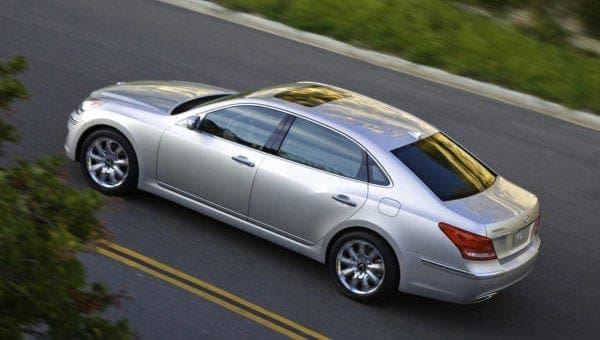
The 2011 version of Hyundai’s flagship luxury sedan, the Equus. The ultra-refined prestige saloon is loaded with all the modern conveniences and luxury items one would expect to find in this market. As well as the usual climate control, leather interior, navigation system, pollen filter, wood trim and other goodies, it featured adaptive cruise control, air suspension and a lane departure warning system as standard equipment.
 Although it had been around in Asia for a few years, Hyundai’s flagship luxury sedan, the Equus, entered the North American market in late 2010. This was the car that would tell the world that the South Korean company could do more than just build mainstream sedans and economy cars and SUVs.
Although it had been around in Asia for a few years, Hyundai’s flagship luxury sedan, the Equus, entered the North American market in late 2010. This was the car that would tell the world that the South Korean company could do more than just build mainstream sedans and economy cars and SUVs.
It was a complete departure for Hyundai in North America and to sweeten the deal for customers, a free Apple iPad came with the car. It contained the driver’s handbook and production information.
Hyundai also initiated a “valet” style of purchasing for the Equus, wherein a sales rep would come to your home and the entire deal could be transacted in your living room.
In 2011, there were two trim levels: Signature and Ultimate. Both were full-size, ultra-refined prestige saloon loaded with all the modern conveniences and luxury items one would expect to find in this market. As well as the usual climate control, leather interior, navigation system, pollen filter, wood trim and other goodies, it featured adaptive cruise control, air suspension and a lane departure warning system as standard equipment.
The top-of-the-range Ultimate version featured a massaging rear passenger seat that reclines and is ventilated. You could also change the seating configuration of the Equus from five to four with the Ultimate version, and it came with a miniature fridge/cooler between the two rear seats. Hyundai figured that a lot of these cars would be chauffeur-driven and occupants of the back seat would need a little refreshment en route.
Power was supplied by the same 4.6-litre V8 engine found in Hyundai’s Genesis sedan, with an additional 30 horsepower on tap, bringing it up to 385. Transmission was a six-speed automatic with manual shift mode, and the Equus also featured an electronic stability control system, ABS, brake distribution system, electronic parking brake and back-up camera.
Performance-wise, Hyundai claimed a zero to 100 km/h time of just over six seconds, and it was a lively automobile for its size. Noise, vibration and harshness (NVH) levels were also exceptionally low and, at first blush, the Equus appeared to be on equal footing with anything else in this upper crust of the market.
No safety recalls to report here, either with Transport Canada or the National Highway and Traffic Safety Administration (NHTSA) in the U.S. However, this latter organization has five technical service bulletins on file. Most of these are service alerts – repair procedures, in other words – for technical personnel, but there is a warning about a “harsh” transmission shift out of park or no shift at all.
Some complaints from customers registered with NHTSA: “while we were driving the car, the car’s front suspension suddenly failed, the front collapsed and the body of the car nearly touched the ground;” “the instrument panel and all of the electrical components failed;” “since I bought my car, it randomly opens the trunk by itself.” NHTSA also has a report of at least one electrical fire and more than one complaint regarding the air suspension.
Consumer Reports had some problems with this one, noting that the upscale Hyundai “doesn’t quite measure up to the established luxury brands.” With electrical, audio system and “body hardware” issues, it only rates an “average” new car prediction from this organization. Adds CR: “we expect reliability of the new models will be 16 per cent above average.”
Some comments from owners to CR: “Love the cool seats and massage in the back;” “like a living room without the noise;” “terrible owners’ manual, must learn features by trial and error;” and “controls are intuitive and less fussy than Lexus or BMW.”
Marketing researcher J.D. Power liked the Equus, giving it top marks for overall quality, performance and design. In terms of predicted reliability, it’s still “better than most” but various issues – suspension, electrical – remain for this first-year model.
More comments from owners: “A South Korean car built like a German car;” “small gas tank;” “size of glove box and console too small;” and “voice activation doesn’t understand commands about 40 per cent of the time.”
2011 Hyundai Equus
Original base price: $62,999
Engine: 4.6-litre V8
Horsepower/torque: 385 hp/333 foot pounds
Transmission: Six-speed automatic with manual shift mode
Fuel economy (litres/100 km): 13.7 city/8.6 highway. Regular gas.
Alternatives: BMW 750Li, Mercedes S550, Lexus 460L, Audi A8, Cadillac STS 4.6.
![]() Ted Laturnus has been an automotive journalist since 1976. He has been named Canadian Automotive Journalist Of The Year twice and is past president of the Automotive Journalists Association of Canada (AJAC).
Ted Laturnus has been an automotive journalist since 1976. He has been named Canadian Automotive Journalist Of The Year twice and is past president of the Automotive Journalists Association of Canada (AJAC).

